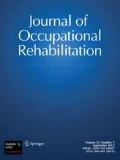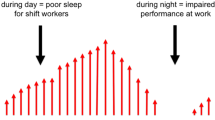Abstract
Purpose: The promotion of a sustainable, healthy and productive working life attracts more and more attention. Recently the Work Role Functioning Questionnaire (WRFQ) has been cross-culturally translated and adapted to Dutch. This questionnaire aims to measure the health-related work functioning of workers with health problems. The aim of this study is to evaluate the reliability, validity (including five new items) and responsiveness of the WRFQ 2.0 in the working population. Methods: A longitudinal study was conducted among workers. The reliability (internal consistency, test–retest reliability, measurement error), validity (structural validity-factor analysis, construct validity by means of hypotheses testing) and responsiveness of the WRFQ 2.0 were evaluated. Results: A total of N = 553 workers completed the survey. The final WRFQ 2.0 has four subscales and showed very good internal consistency, moderate test–retest reliability, good construct validity and moderate responsiveness in the working population. The WRFQ was able to distinguish between groups with different levels of mental health, physical health, fatigue and need for recovery. A moderate correlation was found between WRFQ and related constructs respectively work ability and work productivity. A weak relationship was found with general self-rated health, work engagement and work involvement. Conclusion: The WRFQ 2.0 is a reliable and valid instrument to measure health-related work functioning in the working population. Further validation in larger samples is recommended, especially for test–retest reliability, responsiveness and the questionnaire’s ability to predict the future course of health-related work functioning.

Similar content being viewed by others
References
Council of the European Union. Council conclusions on healthy and dignified ageing; 2980th employment, social policy, health and consumer affairs council meeting. 2009.
Amick BC III, Lerner D, Rogers WH, Rooney T, Katz JN. A review of health-related work outcome measures and their uses, and recommended measures. Spine. 2000;25:3152–60.
Amick BC III, Gimeno D. Measuring work outcomes with a focus on health-related work productivity loss. In: Wittink H, Carr D, editors. Pain management: evidence, outcomes, and quality of life: a sourcebook. Amsterdam: Elsevier; 2008. p. 329–43.
Abma FI, van der Klink JJ, Terwee CB, Amick BC III, Bültmann U. Evaluation of the measurement properties of self-reported health-related work-functioning instruments among workers with common mental disorders. Scand J Work Environ Health. 2012;38:5–18.
Beaton DE, Tang K, Gignac MA, Lacaille D, Badley EM, Anis AH, et al. Reliability, validity, and responsiveness of five at-work productivity measures in patients with rheumatoid arthritis or osteoarthritis. Arthritis Care Res (Hoboken). 2010;62:28–37.
Loeppke R, Hymel PA, Lofland JH, Pizzi LT, Konicki DL, Anstadt GW, et al. Health-related workplace productivity measurement: general and migraine-specific recommendations from the ACOEM Expert Panel. J Occup Environ Med. 2003;45:349–59.
Lofland JH, Pizzi L, Frick KD. A review of health-related workplace productivity loss instruments. Pharmacoeconomics. 2004;22:165–84.
Roy JS, MacDermid JC, Amick BC III, Shannon HS, McMurtry R, Roth JH, et al. Validity and responsiveness of presenteeism scales in chronic work-related upper-extremity disorders. Phys Ther. 2011;91:254–66.
Tang K, Escorpizo R, Beaton DE, Bombardier C, Lacaille D, Zhang W, et al. Measuring the impact of arthritis on worker productivity: perspectives, methodologic issues, and contextual factors. J Rheumatol. 2011;38:1776–90.
Tang K, Pitts S, Solway S, Beaton D. Comparison of the psychometric properties of four at-work disability measures in workers with shoulder or elbow disorders. J Occup Rehabil. 2009;19:142–54.
Williams RM, Schmuck G, Allwood S, Sanchez M, Shea R, Wark G. Psychometric evaluation of health-related work outcome measures for musculoskeletal disorders: a systematic review. J Occup Rehabil. 2007;17:504–21.
Prasad M, Wahlqvist P, Shikiar R, Shih YC. A review of self-report instruments measuring health-related work productivity: a patient-reported outcomes perspective. Pharmacoeconomics. 2004;22:225–44.
Durand MJ, Vachon B, Hong QN, Imbeau D, Amick BC III, Loisel P. The cross-cultural adaptation of the Work Role Functioning Questionnaire in Canadian French. Int J Rehabil Res. 2004;27:261–8.
Gallasch CH, Alexandre NMC, Amick B. Cross-cultural Adaptation, Reliability, and Validity of the Work Role Functioning Questionnaire to Brazilian Portuguese. J Occup Rehabil. 2007;17:701–11.
Abma FI, Amick BC III, Brouwer S, van der Klink JJL, Bültmann U. The cross-cultural adaptation of the Work Role Functioning Questionnaire to Dutch. Work (in press).
Lindbeck A, Snower DJ. Multitask Learning and the reorganization of work: from tayloristic to holistic organization. J Labor Econ. 2000;18:353–76.
Terwee CB, Mokkink LB, Knol DL, Ostelo RW, Bouter LM, de Vet HC. Rating the methodological quality in systematic reviews of studies on measurement properties: a scoring system for the COSMIN checklist. Qual Life Res. 2011;21:651–7.
Endicott J, Nee J. Endicott Work Productivity Scale (EWPS): a new measure to assess treatment effects. Psychopharmacol Bull. 1997;33:13–6.
Mokkink LB, Terwee CB, Patrick DL, Alonso J, Stratford PW, Knol DL, et al. The COSMIN study reached international consensus on taxonomy, terminology, and definitions of measurement properties for health-related patient-reported outcomes. J Clin Epidemiol. 2010;63:737–45.
Mokkink LB, Terwee CB, Knol DL, Stratford PW, Alonso J, Patrick DL, et al. The COSMIN checklist for evaluating the methodological quality of studies on measurement properties: a clarification of its content. BMC Med Res Methodol. 2010;10:22.
Mokkink LB, Terwee CB, Patrick DL, Alonso J, Stratford PW, Knol DL, et al. The COSMIN checklist for assessing the methodological quality of studies on measurement properties of health status measurement instruments: an international Delphi study. Qual Life Res. 2010;19:539–49.
VSNU. Gedragscode voor gebruik van persoonsgegevens in wetenschappelijk onderzoek (Code of Behavior for using Personal Data in Scientific Research). 2005. (Available at the website of the Association of Universities in the Netherlands: www.vsnu.nl).
Amick BC III, Habeck RV, Ossmann J, Fossel AH, Keller R, Katz JN. Predictors of successful work role functioning after carpal tunnel release surgery. J Occup Environ Med. 2004;46:490–500.
Ware J Jr, Kosinski M, Keller SD. A 12-Item Short-Form Health Survey: construction of scales and preliminary tests of reliability and validity. Med Care. 1996;34:220–33.
Ware JE, Kosinski M, Turner-Bowker DM, Gandek B. How to score version 2 of the SF-12 Health Survey. Lincoln, RI: QualityMetric Incorporated; 2002.
Vercoulen JH, Swanink CM, Fennis JF, Galama JM, van der Meer JW, Bleijenberg G. Dimensional assessment of chronic fatigue syndrome. J Psychosom Res. 1994;38:383–92.
Beurskens AJ, Bultmann U, Kant I, Vercoulen JH, Bleijenberg G, Swaen GM. Fatigue among working people: validity of a Questionnaire measure. Occup Environ Med. 2000;57:353–7.
van Veldhoven M, Broersen S. Measurement quality and validity of the “need for recovery scale”. Occup Environ Med. 2003;60(Suppl 1):i3–9.
van Veldhoven M, Meijman T. Het meten van psychosociale arbeidsbelasting met een vragenlijst: De Vragenlijst Beleving en Beoordeling van de Arbeid (VBBA). [Questionnaire on Perception and Judgment of Work]. Amsterdam: NIA; 1994.
Karasek RA. Job Demands, Job Decision Latitude, and Mental Strain - Implications for Job Redesign. Adm Sci Q. 1979;24:285–308.
Houtman I. Reliability and validity of the Dutch version of the Karasek Job Content Questionnaire. Washington, DC: APA/NIOSH Conference on Work, Stress and Health; 1995.
Karasek R, Brisson C, Kawakami N, Houtman I, Bongers P, Amick B. The Job Content Questionnaire (JCQ): an instrument for internationally comparative assessments of psychosocial job characteristics. J Occup Health Psychol. 1998;3:322–55.
Karasek RA. Job Content Questionnaire and Users’s Guide. Los Angeles: University of Southern California, Department of Industrial and Systems Engineering; 1985.
Tuomi K, Ilmarinen J, Jahkola A, Katajarinne L, Tulkki A. Work Ability Index. In: Rautoja S, Pietiläinen R, editors. Finland: K-Print Oy Vantaa. Helsinki: Finnish Institute of Occupational Health; 1998.
Ahlstrom L, Grimby-Ekman A, Hagberg M, Dellve L. The work ability index and single-item question: associations with sick leave, symptoms, and health–a prospective study of women on long-term sick leave. Scand J Work Environ Health. 2010;36:404–12.
Schaufeli WB, Bakker AB, Salanova M. The measurement of work engagement with a Short Questionnaire: a cross-national study. Educ Psychol Measur. 2006;66:701–16.
Schaufeli WB, Bakker AB. Bevlogenheid: Een begrip gemeten. Gedrag en Organisatie. 2004;17:89–112.
Schaufeli WB, Bakker AB. Test manual for the Utrecht Work Engagement Scale. 2003. (Available at http://www.schaufeli.com).
Warr P, Cook J, Wall T. Scales for the measurement of some work attitudes and aspects of psychological well-being. J Occup Psychol. 1979;52:129–48.
de Vet HCW, Terwee CB, Mokkink LB, Knol DL. Measurement in medicine. A practical guide. 1st ed. Cambridge: University Press; 2011.
Nunnally JC, Bernstein IH. Psychometric theory. New York: McGraw-Hill; 1994.
Terwee CB, Bot SD, de Boer MR, van der Windt DA, Knol DL, Dekker J, et al. Quality criteria were proposed for measurement properties of health status questionnaires. J Clin Epidemiol. 2007;60:34–42.
Koolhaas W, van der Klink JJ, Groothoff JW, Brouwer S. Towards a sustainable healthy working life: associations between chronological age, functional age and work outcomes. Eur J Public Health. 2011;22:424–9.
Statistics Netherlands. StatLine database, Available at: http://statline.cbs.nl/StatWeb. Accessed June 2012.
de Lange AH, Taris TW, Jansen PGW, Smulders P, Houtman ILD, Kompier MAJ. Age as a factor in the relation between work and mental health: results from the longitudinal TAS survey. In: Houdmont J, McIntyre S, editors. Occupational health psychology: European perspectives on research, Education and Practice Maia. Portugal: ISMAI Publications; 2006. p. 21–45.
Acknowledgments
The authors report no declaration of interest. This study was financially supported by a grant of SIG (Stichting Instituut Gak), The Netherlands.
Author information
Authors and Affiliations
Corresponding author
Rights and permissions
About this article
Cite this article
Abma, F.I., van der Klink, J.J.L. & Bültmann, U. The Work Role Functioning Questionnaire 2.0 (Dutch Version): Examination of its Reliability, Validity and Responsiveness in the General Working Population. J Occup Rehabil 23, 135–147 (2013). https://doi.org/10.1007/s10926-012-9379-8
Published:
Issue Date:
DOI: https://doi.org/10.1007/s10926-012-9379-8




